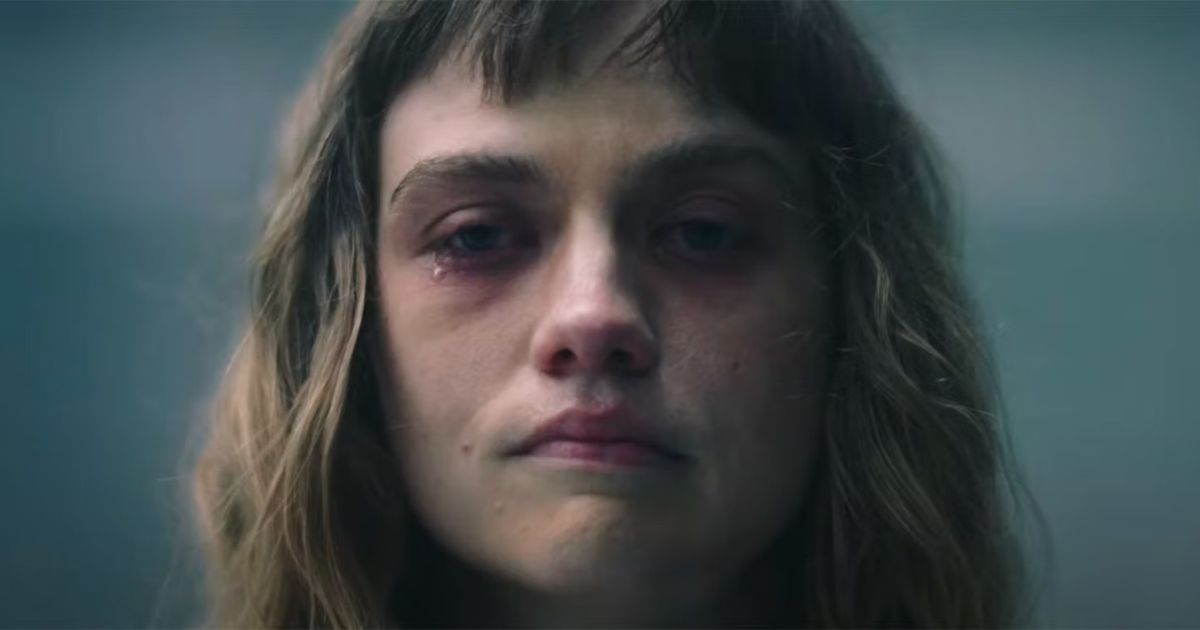It’s in the lobby of the Fairmont Royal York that Mercedes Bryce Morgan and I sit down to talk about her feature directorial debut Fixation. In a few hours, Fixation will have its premiere at Toronto International Film Festival 2022. “I’m feeling so excited. This is everything that we could have hoped for this movie,” Morgan says. “We shot it in Canada two years ago, and to bring it back is kind of perfect. I’m excited to see how people respond to it.”
Almost everyone in the hotel lobby is either working the festival or here to catch a screening, maybe even a celebrity sighting or two. Despite the buzz and excitement in the room, of course, it’s not hard to be drawn into everything Morgan is saying. Perhaps it’s because, along with the anecdotes she shares of bringing Fixation to life and the ideas layered into the film, she’s here with a purpose.
Fixation follows Dora (Maddie Hasson, Malignant), a young woman who has been forced into an institution prior to a trial for a crime she allegedly committed but cannot remember happening. It’s here that Dora is subjected to various psychiatric evaluations that include realistic recreations of her past, led by two doctors, or, perhaps more correctly, captors (Genesis Rodriguez, The Umbrella Academy Season 3, and Stephen McHattie, Orphan Black), who cannot be trusted.
Fixation is a Personal Story for Morgan
“I’ve always been drawn to very surreal works of art as a means of escapism. When I [was growing up], I was like, ‘Hey, I don’t like my surroundings. This will help me get away from them,'” Morgan says when asked where Fixation essentially started for her. Through her brainstorming sessions with story writing partner Katrina Kudlick, they eventually settled upon the idea of using surreal art to confront the past rather than run from it. “[What] we started to think about, too, is if you could go back to an experience from your past, be it like a traumatic event, but you were who you are now, would you do something differently, and what would that be like? Especially if [that traumatic event] was not [consensual].”
Indeed, consent, trauma, and, more significantly, the gaslighting techniques of a patriarchal system that are too often used against women are at the forefront of Fixation. Dora isn’t fully aware of how she came to be at the institution, and despite the doctors’ constant verbal “assurances” of what she has said and done to deserve their treatment, it doesn’t fully click with what Dora ultimately believes to be her truth.
Like many great psychological thrillers, Fixation hinges on its lead actress’ performance, and Hasson, here, is a powerhouse, functioning as our emotional guide into the doctors’ twisted world. “When I saw Maddie perform for the first time, we knew that it had to be her [playing Dora],” Morgan says. “We all just looked at each other, and we had goosebumps and tears in our eyes because you just feel her. A lot of actresses [who auditioned] tried to play it as ‘crazy,’ but [Maddie] plays it as a real person going through this experience.”
On Building Fixation’s Set in an Abandoned Hospital
In addition to the ensemble cast’s performances, what makes Fixation a dynamic and visually impactful film is, of course, the hospital setting in which Dora finds herself trapped. Interestingly, to pull off the austere architecture, and thus the unnatural feeling, of the hospital space, while also being able to jump into where Dora’s memories take place outside it, Morgan and the Fixation team built the entire set in an abandoned, six-story hospital — “A lot of people know it because the building is rainbow on the outside.” — in Sudbury, Canada (about five hours north of Toronto).
Of her decision to build Fixation‘s custom sets within the hospital, Morgan says, “In the movie, we start to see when the surreal-ness is blended with the hospital and the rest of our world, and how we come out of that space and into the rest of it. We wanted complete control of how we move our camera. […] I like things that have a very distinct visual feeling to them [in order] to feel like you’re going through what [Dora] is as well.”
Ultimately, that’s Morgan’s goal with Fixation — to urge the audience to confront the realities of the systems and power structures in place that empower abusers and gaslight the abused. “We’re pulling from our real experiences. This film is very personal to us,” Morgan says. “I think showing that in a true light, if people feel uncomfortable, then that’s okay because you should feel uncomfortable because it’s an uncomfortable subject matter — but [we’re] doing it justice.”
TIFF 2022 runs September 8-18. For tickets, scheduling, and more info, you can visit the festival website.


